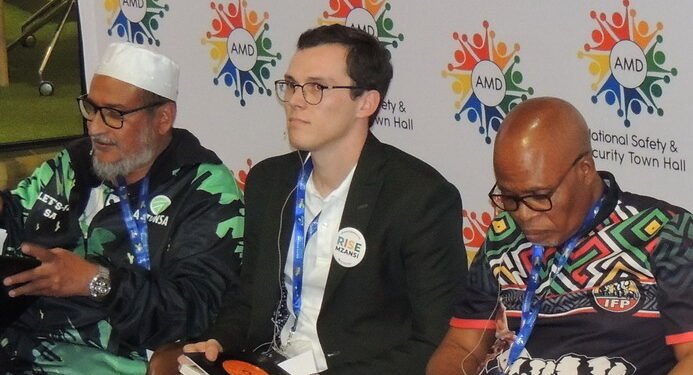
South Africa’s foreign policy is confused, with no clear plan on the deployment of an underfunded, overstretched and old South African National Defence Force (SANDF).
This is according to Ricardo Teixeira, Rise Mzansi Candidate for the National Assembly and defence and national security advocate. He was speaking at the inaugural AMD National Safety and Security Townhall event held in Sandton on 15 May, when South Africa’s political parties expanded on their defence and security policies.
Teixeira started out by saying South Africa has a wonderful Constitution, but its national security priorities need to be redefined in a constantly changing world. He said South Africans must ask what they need and want as a country, as “South Africa’s foreign policy has been all over the place. We’ve had some successes, some failures…With regard to the deployment to the DRC, government has done a bad job informing the public why that deployment is necessary.”
It does not help that the SANDF is underfunded, overstretched, and old. “It recently came out that the average age of deployable soldiers in the SANDF is 40. And when it comes to our structure it reflects that. We’re still using Casspirs and vehicles and equipment that is over 40 years old,” Teixeira told the Townhall assembly.
Regarding force structure, when the SANDF was originally established in 1994, it was not expected to ever again engage in conflict. “That was immediately proven false with the 1998 coup in Lesotho in which we had to intervene in.”
Today, Teixeira said, “we need to look at the risks that we are facing. Most importantly, not only do we have a large coastline…we also have one of the largest exclusive economic zones in the world at approximately 1.5 million square kilometres, and we have three naval vessels to patrol this entire coast,” with smugglers and other criminals operating in South African waters.
Terrorism is another concern, with insurgents operating across the border in Mozambique. Teixeira said it is too soon to be withdrawing from the Southern African Development Community Mission in Mozambique (SAMIM), and this was evidenced by the insurgent attack on Macomia this month as SAMIM withdraws by July.
Internally, “we have constantly relied on the military to perform tasks that are supposed to be left to other departments. Every year we ask them to do more with less. We are deploying the military to fight illegal mining, to protect the borders, to protect infrastructure. Some could argue these are the priorities of the defence force but at the end of the day it’s the priorities of the police.” Teixeira said that the police fail, but every year get a bigger budget, while the SANDF gets less money and has to pick up the slack.
Regarding cyber, South Africa “is as naked as a newborn baby, so much so we are being used as a hacker testing ground,” and South Africa needs better intelligence and to leverage international security partnerships, with the right countries.
South Africa’s national security issues can be solved by first defining the national interest. “We need to focus our national security, and we need to clearly define what the defence force needs to be. This is something the government has failed to do over the last 20 years. We had the 1998 White Paper on Defence, the 2015 Defence Review, the 2020-2025 Strategic Defence Framework. We need a new Defence Review.”
Teixeira said Rise Mzansi doesn’t have all the answers, and things won’t be fixed overnight, but some things that can be done to improve national security are to focus on peacekeeping and counterinsurgency operations, with an improved and better equipped Special Forces capability able to deploy rapidly to asymmetrical threats – this would help avoid disasters like the Battle of Bangui and the Palma attack.
The SANDF should also develop appropriate exit mechanisms and career planning for soldiers, to avoid rank stagnation and allow new soldiers opportunities to progress. Technology must be acquired to serve as force multipliers. Teixeira noted that there is fact budget for new equipment – for example surveillance radars, armoured vehicles and sensors for border protection, but due to procurement issues, little has been delivered yet aside from half a dozen vehicles for border patrol. He said the main problem is political will, and “the desire to get things done is just not there.” This ties in with Rise Mzansi’s slogan of ‘We need new leaders.’









